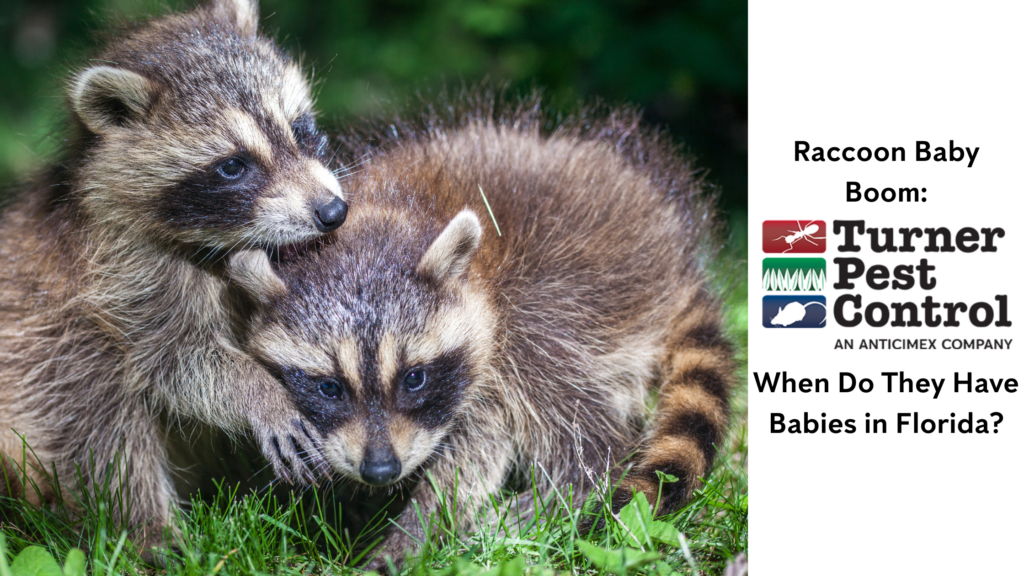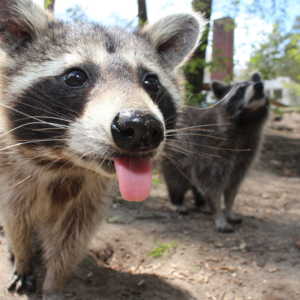
Raccoon Baby Boom: What Time of Year Do Raccoons Have Babies in Florida?
Ever hear strange scratching or thumping sounds coming from your attic during the spring? You might just be experiencing the start of Florida’s raccoon baby boom! Thanks to our warm climate, raccoon breeding season is busy—and if you’re a homeowner, it’s important to know what to expect. In this blog, we’ll cover when raccoons have their babies, why they’re not just cute visitors, and how professional, humane removal can protect your home and family.
When is Raccoon Breeding Season in Florida?
While raccoons are active year-round, their breeding season in Florida typically runs from January through June, with a peak in births during March and April. Our mild winters and early springs make it easier for raccoons to start reproducing earlier than in colder states.
A female raccoon, called a sow, usually gives birth to a litter of 2 to 5 kits. After birth, mother raccoons seek safe, quiet spaces to raise their babies—and unfortunately, attics, crawlspaces, and chimneys often seem perfect to them. If you start noticing noises like chirping, chattering, or scratching overhead this time of year, you might be hosting an unexpected raccoon family.
Why Raccoons Aren’t Pets — and the Damage They Can Cause

It’s easy to mistake raccoons for harmless because of their cute, masked faces and curious behavior. But make no mistake: raccoons are wild animals, not pets. When they move into your home, they can cause serious damage—and even create health risks for your family.
Inside attics and walls, raccoons can:
- Tear up insulation for nesting material
- Chew electrical wiring, increasing fire risks
- Contaminate areas with urine and feces, spreading diseases like leptospirosis, raccoon roundworm, and salmonella
- Damage structures, tearing vents, soffits, and shingles to get inside
A single raccoon can cause thousands of dollars’ worth of damage in a very short amount of time. Even worse, once a mother raccoon establishes a nesting spot, she can become aggressive if she feels her babies are threatened, putting you and your pets in harm’s way.
How Professional Pest Control Humanely Removes Raccoons
If you suspect a raccoon family has moved in, do not try to handle it yourself. DIY removal is not only dangerous—it can also be illegal. In Florida, raccoon removal must follow specific wildlife protection laws that ensure humane treatment.
Professional pest control companies, like Turner Pest Wildlife, use safe and humane methods to remove raccoons, including:
- Live trapping and relocation: We carefully trap adult raccoons and relocate them to approved habitats, far from homes and businesses.
- Baby raccoon reunification: If kits are found alone, they are safely reunited with their mother before relocation whenever possible.
- Exclusion services: Once the raccoons are removed, we seal up potential entry points—like gaps in roofing, soffits, and vents—to keep other wildlife from getting inside.
By using trained technicians, you’re ensuring the safety of your home, your family, and the raccoons themselves. Humane removal isn’t just the ethical choice—it’s also the most effective way to solve the problem for good.
Don’t Let Raccoons Take Over Your Attic—Act Now!
If you’re hearing noises in your attic, seeing raccoons on your roof, or spotting signs of entry around your home, don’t wait. Raccoons move fast—and with babies involved, the longer you delay, the more complicated and costly the situation can become.
Contact our team today to schedule an inspection. Our licensed wildlife experts will assess your home, remove any unwanted raccoon guests humanely, and help you secure your property against future invasions.
Florida’s raccoon baby boom season may be adorable to think about—but it can spell real trouble for homeowners. By understanding when raccoons have babies, recognizing the risks they pose, and trusting professional pest control for humane removal, you can keep your home safe, sound, and raccoon-free.
Need help fast? Call us today for expert wildlife removal services—because your attic should be for storage, not for raccoons!
Call us at 800-225-5305 today or book online — it’s quick and easy!
